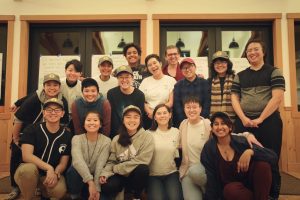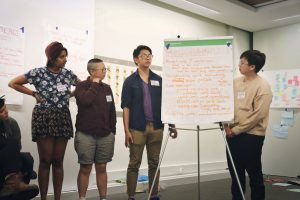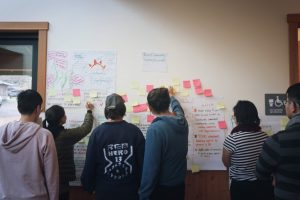Sharing our Learnings: APIENC’s Transformation with the Wildfire Project
Mioi Hanaoka (she/they) has been a long-time supporter and member of APIENC. She is currently part of APIENC’s Communications and Core Committees. As a member of Core, Mioi took part in APIENC’s set of retreats with the Wildfire Project over the course of 2018. Here is her reflection about the process.

Over the course of 2018, APIENC worked with the Wildfire Project—a team of social movement facilitators who fully committed themselves to helping APIENC grow and transform into being a stronger and more sustainable organization. Wildfire Project does more than just training and facilitation; they focus on supporting social movements to thrive and navigate rapidly changing external conditions. As part of the process we held three retreats, each spanning three days (Friday-Sunday), where the three Wildfire facilitators, APIENC staff and APIENC Core members engaged in tough questions and began new practices in order to create cultural shifts within the organization.
Some people might not be familiar with APIENC’s structure. In addition to the two full-time staff people (Sammie and Jasmin), the Core Committee is a collective of individuals rooted in the impact of our initiatives, and who are involved with the day-to-day work of the organization. Staff and Core co-create APIENC’s long-term direction and programs.

During the first retreat, we connected with our ancestors. We collectively reflected on our values and worked on an APIENC timeline, identifying key moments of change, both internally and externally. All of this helped ground us in the hard work that was ahead of us. Through this work at the first retreat, I witnessed a very important pivot. So many of us went into the year without an understanding of the purpose of Core. When we asked ourselves what our purpose was, we realized how much disconnect there was between Core and staff. We weren’t standing on common ground and we didn’t have a shared understanding of APIENC’s goal.
During this retreat, we witnessed a candid discussion between MLin and Sammie, the two staff at the time. Through their sharing and tears, I began to understand the weight of everything they were holding. It was extremely hard and emotional to see. MLin and Sammie reached their limit and were getting burnt out, not necessarily in the amount of work but in the weight of the work and responsibility of the entire community on their shoulders. If nothing changed, APIENC’s future was at stake.
In order to actualize our long term vision of liberation, we realized our work and structures have to be more sustainable in the ways that Core takes on ownership, responsibility and exercises collective agency. We had to distribute the actual work involved. Over the course of the first retreat, we collectively came to the understanding that every decision we make should bring us closer to our goal of liberation. We called it keeping our “eye on the prize.”
By the second retreat, we had established some new shared practices and further worked on what the structure of Core looked like. We reflected on this prompt: “Because APIENC is trying to _____, the purpose of Core is ____. Core members’ role in that is _____. Staff members’ role in that is ______.” Each Core member committed to our own individual practices, and Core as a group committed to shared practices. For example, we would be responsible for organizing and facilitating the quarterly potlucks. We started running meetings, as Core, on a monthly basis to discuss and assess APIENC’s work within each subcommittee and how they connect to the larger goal’s of APIENC. We started taking ownership over the challenges, successes, and goals of the organization. Rather than the weight being on two staff people, we eased the load by collectively holding it together.

The third and last retreat took place at the magical Occidental Arts & Ecology Center. One of the goals of this retreat was to solidify APIENC’s goals for 2019. The Wildfire facilitators guided us through an exercise that allowed us to think about where APIENC should focus our work, especially when taking into account external (political, economic) conditions. We asked ourselves hard questions about strategy: What are real solutions? What are false solutions? What is politically realistic? This exercise helped us understand where APIENC should be in the larger context of movement work. We also asked ourselves hard questions about accountability: What does it mean to be rigorous in the work? How do we hold each other as people, beyond our productivity? What does it mean to feel held in belonging?
Reflecting on the retreats, it wasn’t all logistics and structural conversations. I can assure you that the retreats were exhausting. They were only effective if we brought all of ourselves and all of our energy into the space. There was laughter, moments of introspection, moments of doubt and inspiration, moments of tears, and moments where we questioned if there was enough trust among ourselves to do the work. Core is comprised of 12 individuals (plus staff). We are all in different places, lead our own separate lives, and have varying levels of capacity. So sometimes it is challenging to remain focused and dedicated to our new shared practices as a group.
I’m still sitting with the uncomfortable fact that Core’s structure is still a work in progress. There are still questions left unanswered, but at least we know what the goal is. At least we know what is at stake and at least we remain focused on “the prize.”
It is bittersweet that our work with the Wildfire Project has ended. However, we will always remain connected with them and their network of social movement organizations. Our work with the Wildfire Project has left us with the necessary tools to ensure that APIENC continues to grow and transform in a sustainable way. We now know what healthy accountability looks like. We know the importance of grounding ourselves in APIENC’s core values. We know what it takes to achieve our collective goal of liberation. And we now know that in order to achieve this goal, we need to share our learnings with the rest of our community so that we can create meaningful change together, with a sense of purpose and agency.
It is a new year, and I want the APIENC community to think about a prompt that was given to Core members during the 3rd retreat. Fill it out and share it with one other person.
What we really need is _________. What we are protecting our people from is _________. What we believe is possible is ___________. (We = QTAPI people in the Bay Area)

